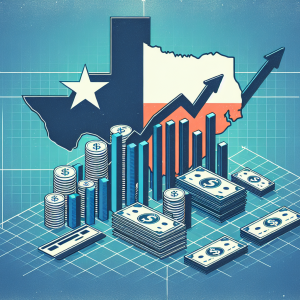The financial landscape of Texas City has undergone a significant change in recent months. A surge in credit card debt levels has drawn the attention of economists, financial advisors, and local authorities alike. As the debt reaches record highs, concerns over the broader economic implications are mounting. This article delves into the rising credit card debt in Texas City, examining the factors contributing to this trend and exploring the potential economic consequences.
Texas City Faces Surge in Credit Card Debt Levels
Texas City has recently seen a dramatic increase in credit card debt among its residents. According to recent data from the Federal Reserve, the average credit card balance per household in Texas City has risen by 15% over the last year. This sharp uptick can be attributed to several factors, including a rise in consumer spending, increased reliance on credit for everyday expenses, and the lingering economic effects of the COVID-19 pandemic.
One notable trend is the growing reliance on credit for essential purchases. Many residents have found themselves using credit cards to cover basic necessities such as groceries, gas, and utility bills. Inflationary pressures have exacerbated the situation, making it increasingly difficult for individuals to manage their day-to-day expenses without resorting to credit. Financial advisors in the area report a significant increase in the number of clients seeking advice on managing mounting credit card debt.
Texas City’s younger population has been particularly affected by the surge in credit card debt. Millennials and Gen Z individuals, many of whom are already grappling with student loan payments and high housing costs, are now facing the additional burden of credit card debt. This demographic shift poses unique challenges for the city’s economic future, as younger generations find themselves hampered by financial obligations that could impact their long-term financial health and spending power.
Record High Debt Raises Economic Concerns
The record high levels of credit card debt in Texas City have sparked a wave of economic concern. Economists warn that the rising debt levels could lead to a decrease in consumer spending, which in turn could slow down local economic growth. As more residents allocate a larger portion of their income to debt repayment, discretionary spending on goods and services is likely to decline, negatively impacting local businesses and the broader economy.
Local government officials are also closely monitoring the situation, recognizing the potential risks to the city’s financial stability. High levels of credit card debt can lead to increased default rates, which might strain local financial institutions. Additionally, as residents struggle to meet their debt obligations, there could be a rise in bankruptcies and foreclosures, further destabilizing the housing market and creating a ripple effect throughout the local economy.
In response to these concerns, several community organizations and financial institutions in Texas City have launched initiatives aimed at promoting financial literacy and debt management. Workshops on budgeting, credit counseling services, and educational programs on responsible credit use are being offered to help residents navigate their financial challenges. While these efforts are commendable, the root causes of the debt surge, such as wage stagnation and rising living costs, require broader policy interventions to ensure long-term economic stability.
The rise in credit card debt in Texas City is a multifaceted issue with far-reaching economic implications. As residents grapple with the growing financial burden, it is crucial for policymakers, community leaders, and financial institutions to work together to address the underlying causes and provide support to those in need. By promoting financial literacy, offering debt management resources, and implementing policies that address wage and cost-of-living concerns, Texas City can take steps to mitigate the impact of rising credit card debt and foster a more stable, sustainable economic environment for its residents.
